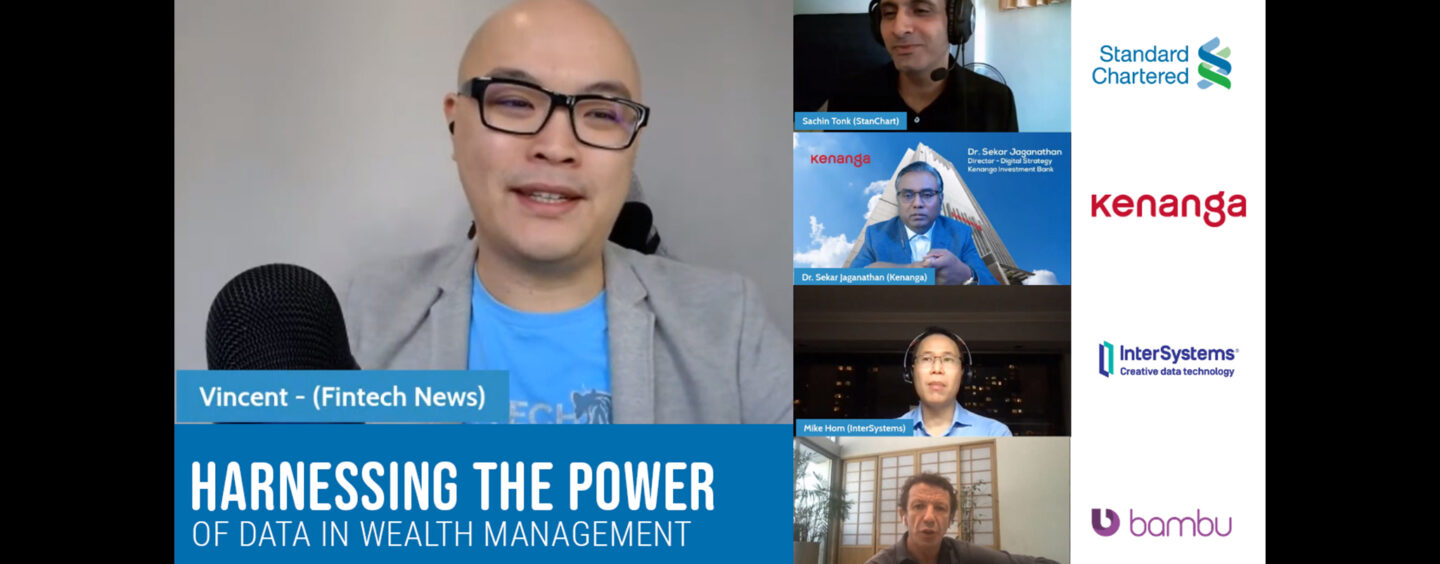
4 Key Considerations For Wealth Managers Looking to Unlock the Value of Data
by Fintech News Singapore March 5, 2021When we talk about wealth management today in fintech, more often we’re talking about how to create wealth: goal setting, risk profile management, or simply investment management overall. But Dr. Sekar Jaganathan, Director of Digital Strategy in Kenanga Bank opines that “wealth management” as it stands now more often refers to wealth creation: goal setting, risk profile management, and also investment management.
Wealth management as the term entails should include data from one’s lifestyle, such as spending habits and insurance.
“Wealth management [as an industry] has to grow. Then it has to mature,” said Dr. Sekar.
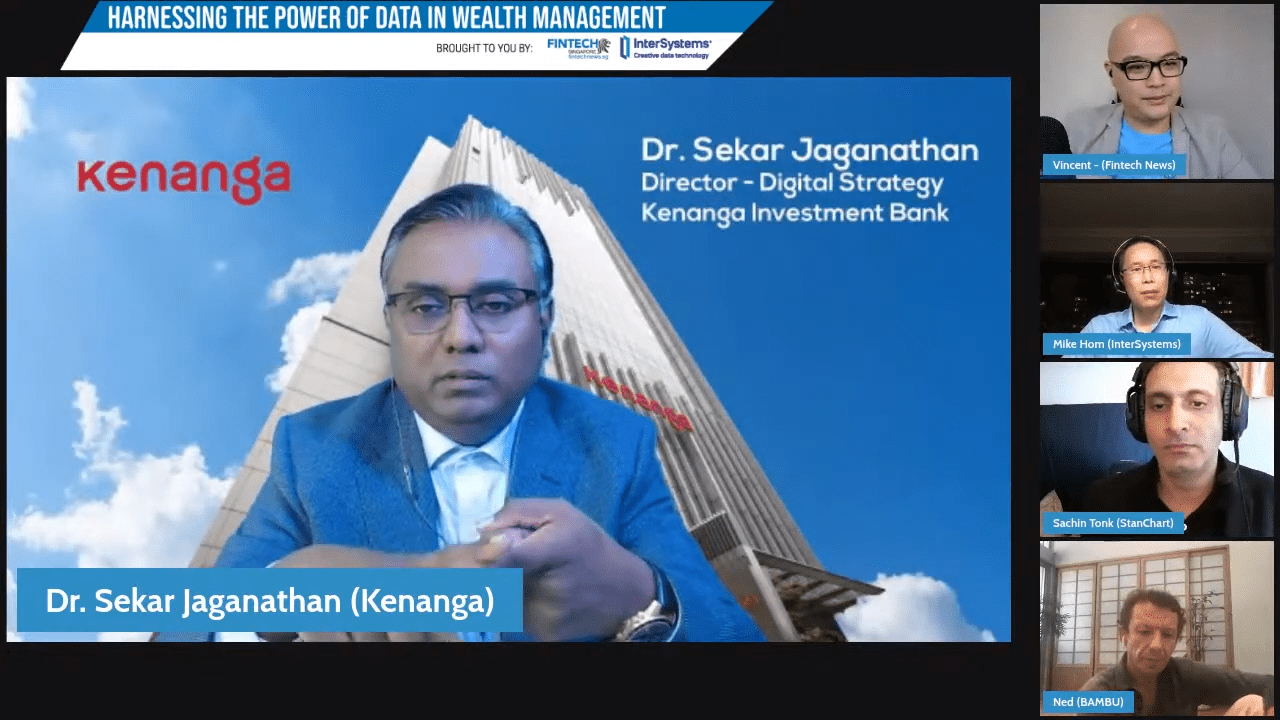
Sekar Jaganathan, Director of Digital Strategy in Kenanga Bank – Harnessing the Power of Data in Wealth Management Webinar
This was one of the talking points during the “Harnessing the Power of Data in Wealth Management” webinar hosted by Fintech News Network and sponsored by InterSystems, an industry-leading provider of high-performance database management software which allows for rapid application development, integration and analytics capabilities.
Dr. Sekar was one of the four panelists there that day, who are all keen participants in wealth management, and also in agreement that data analytics in wealth management is indeed a very young sector and how it will eventually mature is anyone’s guess.
However, this wouldn’t be a fireside chat if the panelists didn’t put out their own thoughts about what might be coming up.
Hyper-personalisation: The Natural Conclusion
The panelists had strong opinions on hyper-personalisation, thanks to the wealth of data we’re able to collect today.
“We actually don’t believe that individuals are the right people to understand their own retirement, their own risk, and their own choices,”
said Ned Philips, founder of Bambu.
“In fact history has shown us that people are actually very bad at managing money and making investment choices. Indeed in America today, almost 50% of people run a cashflow negative life.”
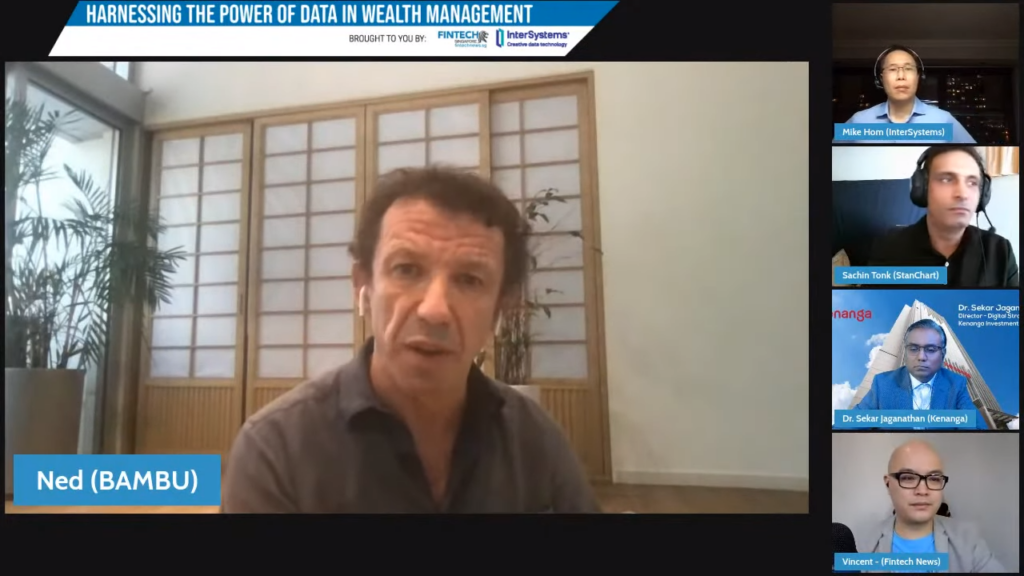
Ned Philips, founder of Bambu -Harnessing the Power of Data in Wealth Management Webinar
Bambu is planning on launching Predictive Financial Planning. Given information like your spending habits, lifestyle, education, income, kids, where you live and etc., and the platform will give retail customers three possible paths without even asking–essentially going about it how Google might.
Mike Hom, Head of Financial Solutions in InterSystems meanwhile, agrees that recent advancements would benefit the customer. While some industry observers may see the end of human financial advisors thanks to the arrival or AI in wealth management, Mike isn’t heralding the end of human financial advisors just yet. After all, humans are naturally diverse and some may prefer the human touch, while others may prefer the simplicity of interacting with a computer.
“And I think that is great, because it tailors to what people want,”
said Mike.
“From the institutional side, you can expand your customer base. How many clients can one advisor take on? Well with some help, some advice and some insights that were given to them immediately, he or she can probably service a lot more [customers].”
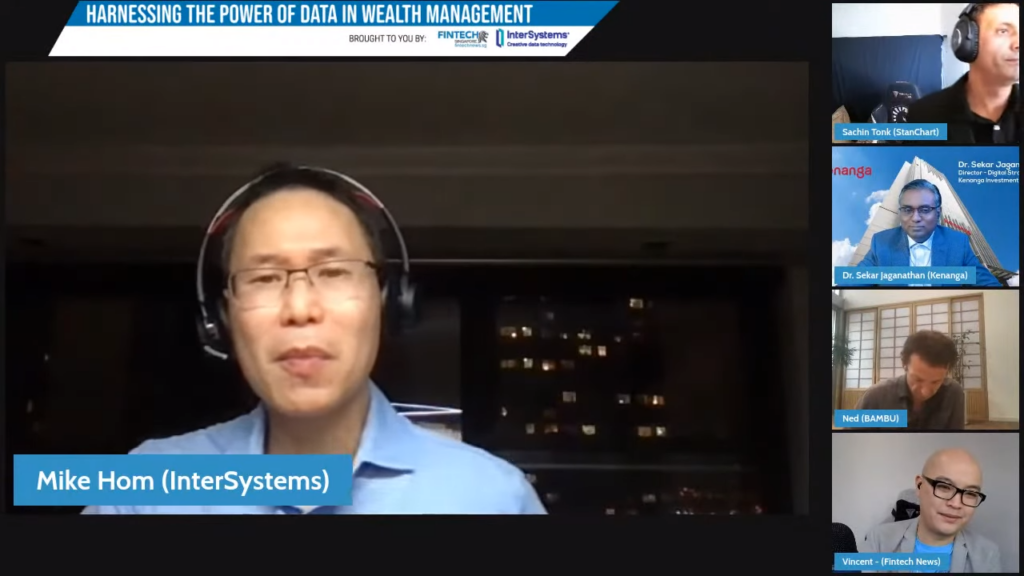
Mike Hom, Head of Financial Solutions in InterSystems – Harnessing the Power of Data in Wealth Management Webinar
Or, for example, a financial firm could potentially prevent customer turnover by understanding the events in their lives.
“What if [the firm] were able to come to you to say ‘hey, maybe you lost your job, maybe there’s something going on, maybe you need a loan’ or something of that form. Some sort of financial ability that you’re seeking, but you didn’t want to talk [about]. Maybe we offer that upfront. And that kind of ability helps with customer retention.”
In fact, Dr. Sekar stated that “the robo advisory platforms itself are moving into hybrid advisory already. The human factor in advisory is important to keep the checks and balances, and also the human touchpoint.”
Before Hyper-Personalisation Comes The Basics
“The biggest challenge is fundamentals,”
said Sachin Tonk, Director in Data, Advanced Analytics and Privacy of Standard Chartered Bank.
“We say a lot about ourselves, we have technology, we have machine learning, we have artificial intelligence, but we still struggle to make our data speak. Only 20% – 30% of data sees the light of a use case.”
“If you’re going to collect every damn thing, every full stop and every comma but you don’t know what you’re collecting it for, you’ll actually have artificial intelligence built on rubbish,” said Sachin.
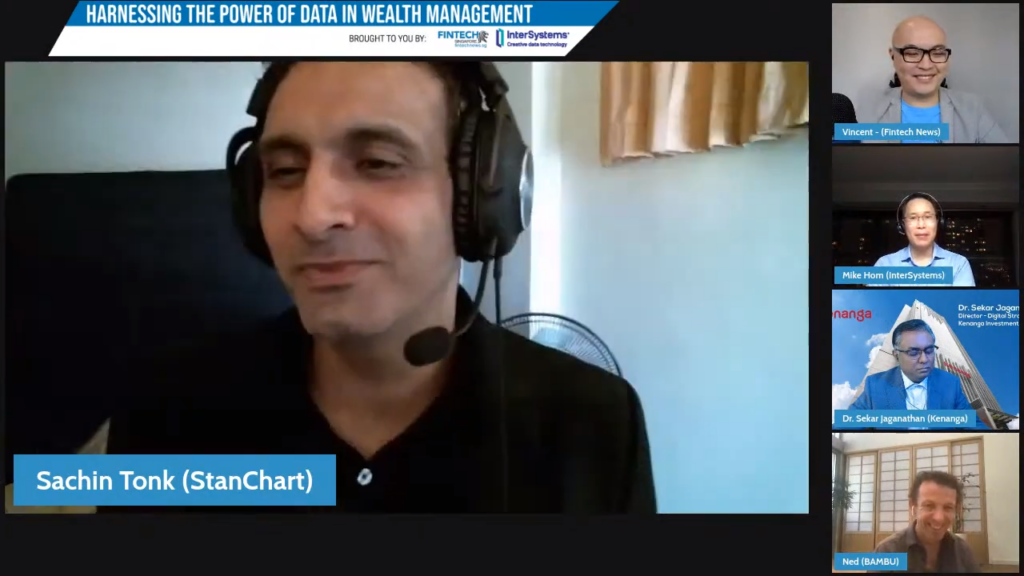
Sachin Tonk, Director in Data, Advanced Analytics and Privacy of Standard Chartered Bank – Harnessing the Power of Data in Wealth Management Webinar
“You have a good strategy of hyper-personalisation, but it’ll be yours and not your customer’s.”
The sin that most firms commit it seems, stems from approach. Sachin recommends starting outside-in when collecting data. Today’s customers naturally distrust institutions looking to collect financial data, especially if done without their knowledge.
“If you can tell your customer why you’re collecting the data and you understand the data’s value, that builds trust at the point of data source. Which makes it work best for you and your customer. You know why you’re collecting it, and why your customer needs it.”
Mike also had a lot to say about data quality, having said:
“Lots of times you have a lot of data and you don’t know what to do with it. You don’t know what it is. Getting context and understanding the relationships and how they pull together, that’s very important. Data quality, I don’t think I need to speak too much about it: garbage in, garbage out.
Mike brought up a firm they’re working with that are doing things in reverse, thus preventing them from being agile. The firm already has models, but seeks to add explainability, traceability, and data lineage.
“Now imagine if you have to scrap everything to do that, it’s really bad [for a company]. Someone’s getting fired.”
“So you really have to think about how you structure your platform in making sure that you can honestly be agile. It starts with basic building blocks. And if you don’t have a strong foundation you can only go so far.”
Data Privacy is a Fundamental Element
While the Malaysian government is in the process of amending these laws to allow for innovations that have been enjoyed by Europeans under the Payment Service Providers Directive (PSD), at this juncture Malaysia’s laws decree that citizens’ information like ID numbers and personal data belongs to them.
“So the government is also an intermediary that collects data, but they don’t own the data. So they can’t create the API to share it with an entity. They can do validation, but they can’t give it to you.”
Using Malaysia as an example. Dr. Sekar further elaborated that “I think the onus is on organisations at the moment.”
“There’s no restriction for customers to share their data with an organisation. That’s where organisations need to build trust, and not wait for regulators to build that trust for your customers and give it to you.”
Mike, added that “You can talk about data privacy and ensuring that customers own their data, but how do you control it? For the masses, how do you help people manage their own data? I don’t have the answer. It’s not the regulator’s responsibility, but they play a key role”.
Ned thinks the responsibility is not held by any one party.
“Privacy is crucial because we can lose a lot of trust if we get privacy wrong. That’s a key question: how do we get that balance right?”
“It’s not just on the regulators, it’s not just on the incumbent banks and it’s not just on the startups. It needs all of us, whether startups like us, Kenanga, Standard Chartered, AND regulators to push a little bit.”
“Data is The New Oil”—But Not In the Way that You Think
According to Sachin, “90% of all data captured by humankind was collected over the past 2 years. You can imagine that data has been around ever since the barter system. What has changed is that there’s a rat race of capturing more and it resonates to the top.”
“I think a thing to be mindful of is the speed in which we capture the data. In 150 years, we won’t have space to capture data anymore. So what’re we gonna do? Data destruction is also one of the one important things that’ll come up.
“We all say that data is the new oil. The only thing which we need to be really responsible with is to treat it like oil—a limited resource. It goes back to the fundamentals [which is] capture if you need to; a use case driven approach.”
And as with the oil rigs in real life, the ethics of how data is utilised and operated upon may change in the future, once adverse impact is felt by the people. Therefore, Dr. Sekar opined that it’s important to get things right early and consider the lines in the sand today.
“Perhaps, there’s going to be at least one player out there who will collect data and exploit it. And the regulators are going to come down hard. And when that happens everyone doing it is going to be affected.”
“We need to know the hurdles that’s going to happen as well and manage them now. Because if you manage it from now; keeping it hygienic and ethical, it won’t be a problem. It’ll be an opportunity for you to take the lead role when things happen in the future with wealth management.”
The full discussion originally appeared in “Harnessing the Power of Data in Wealth Management” about wealth management can be found here, hosted by Fintech Fireside Asia.







